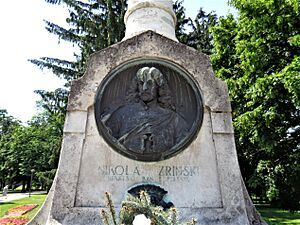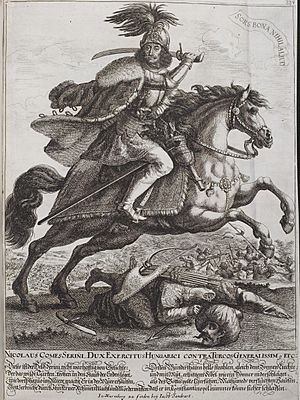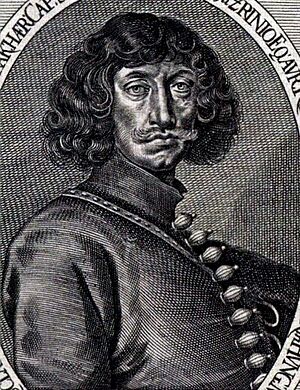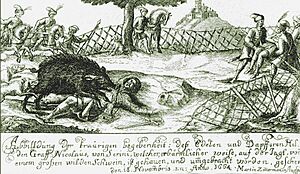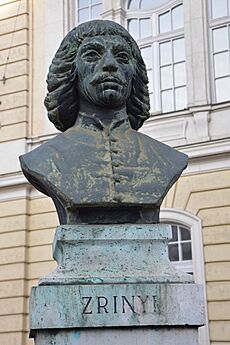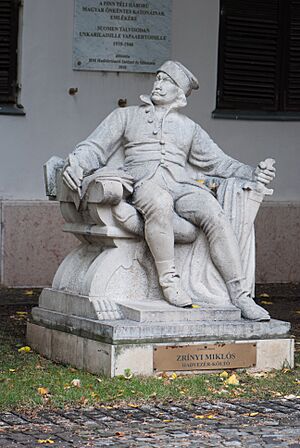Miklós Zrínyi facts for kids
Quick facts for kids
Nikola Zrinski
Zrínyi Miklós |
|
|---|---|
| Ban (viceroy) of Croatia | |
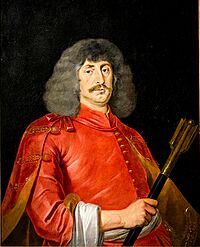
Portrait of Nikola Zrinski by Jan Thomas van Ieperen, Lobkowicz Palace, Prague.
|
|
| Ban of Croatia | |
| Reign | 1647–1664 |
| Predecessor | Ivan III Drašković |
| Successor | Petar Zrinski |
| Born | 5 January 1620 Csáktornya, Kingdom of Hungary (now Čakovec, Croatia) |
| Died | 18 November 1664 (aged 44) Kursanecz, Kingdom of Hungary (now Kuršanec, Croatia) |
| Noble family | House of Zrinski |
| Spouse(s) | Marija Euzebija Drašković Marija Sofija Löbl |
| Father | Juraj V Zrinski |
| Mother | Magdolna Széchy |
Miklós Zrínyi (also known as Nikola VII. Zrinski in Croatian) was an important military leader, statesman, and poet. He was born on January 5, 1620, and died on November 18, 1664. He belonged to the House of Zrinski, a powerful noble family from Croatia and Hungary. Miklós Zrínyi wrote the first epic poem in Hungarian literature, called The Peril of Sziget.
Contents
Life Story of Miklós Zrínyi
Miklós was born in Csáktornya, which is now Čakovec, Croatia. His father, Juraj V Zrinski, was Croatian, and his mother, Magdolna Széchy, was Hungarian. He loved learning Hungarian language and literature. However, he focused mostly on military training. From 1635 to 1637, he traveled through Italy to learn more.
Early Military Career
Over the next few years, Miklós became a skilled soldier. He defended the Croatian border against the Ottoman Empire. He proved to be one of the best commanders of his time. In 1645, during the end of the Thirty Years' War, he fought against Swedish troops. He even paid for his own army group.
At Szakolcza, he defeated a Swedish division and captured 2,000 soldiers. He also saved the Holy Roman Emperor, Ferdinand III, from a surprise attack. Later, he defeated the army of George I Rákóczi, a prince supported by the Ottomans. For his bravery, the emperor made him captain of Croatia. After the war, he married Eusebia Drašković.
Becoming Ban of Croatia
In 1646, Zrínyi continued to fight bravely against the Ottomans. At the coronation of Ferdinand IV, he carried the state sword. He was then made Ban (a high-ranking governor) and captain-general of Croatia. In this role, he led many Croatian meetings.
From 1652 to 1653, Zrínyi was constantly fighting the Ottomans. Even so, he kept in touch with smart people of his time from his castle in Csáktornya. A Dutch scholar, Jacobus Tollius, visited him. Tollius was amazed that Zrínyi could speak Croatian, Hungarian, Italian, German, Ottoman Turkish, and Latin easily.
In 1655, Zrínyi tried to become the Palatine of Hungary. This was a very important position. Even though many nobles supported him, he did not succeed. The king chose someone else instead.
Key Events in 1664
The last year of Miklós Zrínyi's life was very important. In 1663, the Ottoman army, led by Grand Vizier Köprülü Ahmed, attacked Hungary. Their goal was to capture Vienna. The imperial army struggled to stop them. Bad weather eventually halted the Ottoman advance.
Leading the Hungarian Army
To prepare for another Ottoman attack, German troops arrived. France also sent help. Zrínyi was made commander-in-chief of the Hungarian army. He worked under the overall command of the Italian general Raimondo Montecuccoli.
In 1664, Zrínyi planned to destroy the important Suleiman Bridge near Osijek. This bridge connected Darda to Osijek. Destroying it would cut off the Ottoman army's retreat. It would also make it impossible for them to get more soldiers for months. Zrínyi captured several fortresses on his way. He advanced 240 kilometers into enemy land. On February 1, 1664, he successfully destroyed the bridge.
However, other generals refused to help him continue the campaign. The court in Vienna was suspicious of Zrínyi. They thought he wanted Hungary to break away. They also accused him of disturbing the peace. This was because he built his own castle, Novi Zrin, in 1661. This castle was in a neutral zone between the two empires.
Zrínyi tried to capture Kanizsa, a key Turkish fortress. But the siege was delayed because General Montecuccoli was jealous. Later, the emperor's military commanders retreated. They did not want to fight the Grand Vizier's army coming to help Kanizsa.
European Recognition and Death
Even though the siege failed, Zrínyi's expedition made him famous across Europe. People said that only the Zrínyis knew how to defeat the Turks. Emperor Leopold offered him the title of prince. Pope Alexander VII made a special medal with Zrínyi's image. The King of Spain, Philip IV, gave him the Order of the Golden Fleece. King Louis XIV of France made him a Peer.
After relieving Kanizsa, the Grand Vizier attacked Novi Zrin. The Imperial troops did nothing to help. Zrínyi rushed to defend the castle, but it fell. The court in Vienna focused on protecting the Hungarian-Austrian border. They sacrificed Novi Zrin to stop the Turkish army. The Turkish army was eventually defeated at the Battle of Szentgotthárd in 1664.
This defeat could have freed Hungary from Turkish rule. However, the Habsburg court signed the Peace of Vasvár. This treaty had unfavorable terms for Hungary. Zrínyi went to Vienna to protest, but he was ignored. He left the city feeling angry. He told the Venetian minister that he would help Venice against the Ottomans with 6,000 men.
Zrínyi then returned to Csáktornya. It is believed that he started a secret plan. This plan, later known as the Wesselényi conspiracy, aimed to make Croatia and Hungary independent kingdoms again. However, on November 18, 1664, he died in a hunting accident. He was killed by a wounded wild boar in a place called Kursanecz (now Kuršanec, Croatia). Some people still believe he was assassinated by order of the Imperial Court. No clear proof has ever been found for this claim. However, his death meant that both the Habsburgs and the Ottomans lost a powerful opponent in Hungary. The village where he died was renamed Zrínyifalva in his memory.
Literary Works
Besides being a great military leader, Zrínyi is also famous for his writings. He is often called "Miklós Zrínyi, the poet, general, and politician." He wrote the first epic poem in Hungarian literature.
Zrínyi's most important literary work is The Peril of Sziget (also called Szigeti veszedelem or Zrínyiász). This epic poem was written in the winter of 1648–1649. It was published in 1651 with other poems. The poem tells the heroic story of his great-grandfather, Nikola IV Zrinski. Nikola IV Zrinski bravely defended Szigetvár, though unsuccessfully.
Many people praised the poem for its strong writing. It made Zrínyi the most important Hungarian poet of the 17th century. The poem also inspired people with its message. It showed that Hungarian and Croatian bravery, with God's help, could defeat Ottoman rule. Zrínyi's brother, Petar Zrinski, translated the epic into Croatian.
Zrínyi also wrote important essays and manifestos. These works showed his ideas about politics and military science. He argued for a strong national army. He also wanted the nation to become stronger morally. He dreamed of reuniting Hungary and driving out the Turkish invaders.
Honors and Legacy
Miklós Zrínyi has been honored on postage stamps. Hungary issued stamps featuring him on January 1, 1943, May 1, 1945, June 18, 1966, August 18, 2000, and September 5, 2008.
See also
- List of Bans of Croatia
- Magnate conspiracy
 | Laphonza Butler |
 | Daisy Bates |
 | Elizabeth Piper Ensley |


